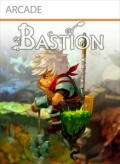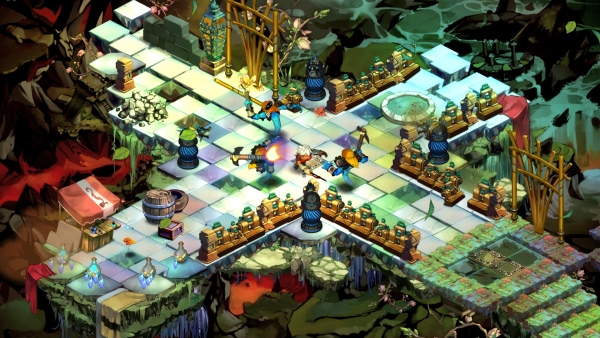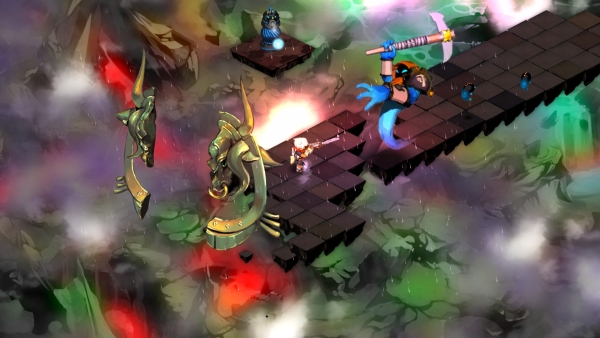
Bastion is an action RPG for The Kid in all of us. Developed by Supergiant Games, Bastion is clearly a love letter to the bygone days of the Super NES. Anyone who grew up on The Legend of Zelda: A Link to the Past or Secret of Mana will know exactly what to do after a world-shattering Calamity opens the game.
But if you don’t know where to start, a powerful voice will guide you through the world of Bastion… and at no time will he screech “Hey! Listen!”
Platforms: PC, Xbox 360 (Version Played)
Publisher: WB Games
Developer: Supergiant Games
Genre: A Yarn-Spinning Action RPG
Release Date: July 20, 2011 (Xbox 360), August 16, 2011 (PC)
ESRB Rating: Everyone 10+
 If you’ve played an action RPG before, you’ll know what to expect from Bastion. It’s a workman-like RPG that doesn’t try to reinvent the wheel. The game does more than just ape the style of Zelda: A Link to the Past and Secret of Mana; it actually feels like a continuation of those two Super NES classics. Instead, Bastion puts all its innovation eggs in the audio basket. More specifically, in the narration provided by voice actor Logan Cunningham.
If you’ve played an action RPG before, you’ll know what to expect from Bastion. It’s a workman-like RPG that doesn’t try to reinvent the wheel. The game does more than just ape the style of Zelda: A Link to the Past and Secret of Mana; it actually feels like a continuation of those two Super NES classics. Instead, Bastion puts all its innovation eggs in the audio basket. More specifically, in the narration provided by voice actor Logan Cunningham.
Cunningham voices Rucks, a mysterious old man who clearly knows more about The Calamity than he lets on. The main character, known only as The Kid, travels further into the wasteland of the world that was, as Rucks talks over the action to describe the events on screen. He’ll comment on The Kid’s choice of weapon (“The Kid swings that hammer”) or what might be down the path he chose when the trail splits (“The Kid wants to make sure he didn’t miss anything”) or some little detail about a boss character that’s up ahead (“The Kid’s never seen an Anklegator before…”). Cunningham ‘s deep “seen it all” voice is perfect for this kind of narration and it brings the game alive in a way that you’d never expect. I actually often found myself pushing forward just to see what the narrator would say, and I’d get sad if he remained silent.
In addition to Cunningham as Rucks, the whole audio experience of Bastion is amazing. Described by composer Darren Korb as “acoustic frontier triphop,” Bastion’s score stirred a longing in me for a world that is no more (and a longing for a “space western” television series that’s no more as well). Hmm, come to think of it, Rucks’s gruff narration and the game’s signature song, “Build That Wall,” would feel just as home in an episode of “Firefly” as they do in Bastion.

After seeing how closely Bastion mirrored two of my favorite games from when I was a kid, I was thrilled. Because of this familiarity, I never had any problems worrying about where to go or what to do. All of that quickly became second nature and I could just let the narration wash over me as I attempted to put the world back together after The Calamity. Even the beautiful hand-drawn artwork used to create the creatures and the environments seems to harken back to the 16-bit era.
Rebuilding the world also means rebuilding the Bastion as The Kid will have to place six buildings in the stronghold to continue his quest. They include the Arsenal, a place to switch weapons and Secret Skills; the Forge, a place to upgrade weapons; the Lost-and-Found, your standard RPG item shop; the Distillery, a place to equip those items; the Memorial, a place to track your achievements; and the Shrine, a place to pledge your life to a vengeful god to increase the difficulty of the game.
The Kid is also given an increasingly abundant cache of weapons. Starting out with his trusty hammer, new weapons are doled out at a pretty steady clip (including one that isn’t activated until the final few minutes of the game). The Kid will eventually acquire a variety of guns, a sword, a spear, a bow, a flamethrower and even a rocket launcher. However, he is only able to change weapons at an Arsenal and the game strangely forces any found weapons to replace a weapon The Kid is currently carrying. Not being able to switch weapons during the action (Arsenals are occasionally seen in the wild, but they’re rare) and having a new weapon forced on you is irritating.

While the melee weapons all feel good and solid, the targeting system for ranged weapons is terrible. Properly aiming a weapon like the bow or the rifle and then connecting with a shot before the enemy moves is a chore. It was so bad that I stopped using ranged weapons about halfway through the game.
The Bastion, the buildings, the weapons and even a trio of dream worlds are all tied together by Rucks’s narration. Piece by piece, the world of Caeledonia is explained as the old man talks about the history of a weapon or delves deeper into The Kid’s backstory (which he knows because The Kid talks in his sleep). The narration is connected to everything and it brings the world of Bastion alive in a way that few games do.
Supergiant kept the explanation of The Calamity purposely vague, but each level seems to exist as a floating island; the world only appears below The Kid’s feet as he walks forward, like Magneto in the first X-Men movie. I could never figure out if the floating islands were a plot point or a stylistic choice, but they create edges in the game world that The Kid can fall off. There’s little penalty for falling into the abyss, but in a world where everything else was so well thought out, the edges stand out as a particularly odd choice.
Bastion takes a well-worn genre and shocks it to life with an audio experience that is second to none. The action RPG gameplay might not break any new ground, but Rucks’s booming voice will shake the way you look at storytelling in games. I can’t wait to see what Supergiant is up to next.

Review Disclosure: A retail copy of Bastion was purposed by Warp Zoned for the purposes of this review.







